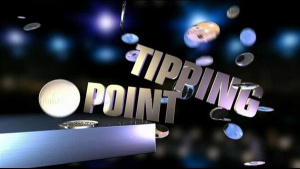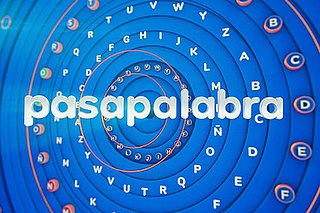
The Weakest Link is a British television quiz show, mainly broadcast on BBC Two and BBC One. It was devised by Fintan Coyle and Cathy Dunning and developed for television by the BBC Entertainment Department. The game begins with a team of nine contestants, who take turns answering general knowledge questions within a time limit to create chains of nine correct answers in a row. At the end of each round, the players then vote one contestant, "the weakest link", out of the game. After two players are left, they play in a head-to-head penalty shootout format, with five questions asked to each contestant in turn, to determine the winner.

Hollywood Squares is an American game show in which two contestants compete in a game of tic-tac-toe to win cash and prizes. The show piloted on NBC in 1965 and the regular series debuted in 1966 on the same network. The board for the game is a 3 × 3 vertical stack of open-faced cubes, each occupied by a celebrity seated at a desk and facing the contestants. The stars are asked questions by the host and the contestants judge the truth of their answers to gain squares in the right pattern to win the game.

The Krypton Factor is a British game show produced by Granada Television for broadcast on ITV. The show originally ran from 7 September 1977 to 20 November 1995 and was hosted by Gordon Burns and usually broadcast on the ITV network on Mondays at 7.00pm.

Chain Reaction is an American television game show created by Bob Stewart, in which players compete to form chains composed of two-word phrases.
Going for Gold is a British television game show that originally aired on BBC1 between 12 October 1987 and 9 July 1996. It was revived for Channel 5 from 13 October 2008 to 20 March 2009.

Telly Addicts was a British television game show that aired on BBC One from 3 September 1985 to 29 July 1998, and hosted by Noel Edmonds. All questions were based on television programmes past and present, and generally took the form of a short clip being shown followed by a series of questions either specifically about the clip or more generally about the programme from which it had been taken. Two teams sat opposite each other on sofas. The final series in 1998 had three teams of two players.

Who Wants to Be a Millionaire? is a British television quiz show, created by David Briggs, Steven Knight & Mike Whitehill for ITV. The programme's format sees contestants taking on multiple-choice questions based upon general knowledge, winning a cash prize for each question they answer correctly, with the amount offered increasing as they take on more difficult questions. If an incorrect answer is given, the contestant will leave with whatever cash prize is guaranteed by the last safety net they have passed, unless they opt to walk away before answering the next question with the money the cash prize they had managed to reach. To assist in the quiz, contestants are given a series of "lifelines" to help answer questions.

Miljoenenjacht, officially Postcode Loterij Miljoenenjacht, is a Dutch game show, sponsored by the country's postcode lottery, where a contestant and at-home viewer could win up to €5,000,000 or as little as €0.01. The show is broadcast at various times, spanning across six episodes for each set. The program was originally shown by TROS on NPO 2, but moved to creator John de Mol's channel Tien in 2005. After the channel was discontinued after its sale to the RTL Group, the program moved to RTL 4. In 2019, the program moved to SBS6 due to the transfer of Linda de Mol from RTL to SBS.
Sale of the Century was a British game show based on a US game show of the same name. It was first shown on ITV from 9 October 1971 to 6 November 1983, hosted by Nicholas Parsons. Special Celebrity Sale of the Century editions aired occasionally, starting on 2 January 1981 with Steve Jones as host.
Love Me, Love Me Not is a Canadian game show based on the Italian game show, M'ama non m'ama, which in English means "love me, love me not". Both shows were created by Steve Carlin, the producer of The $64,000 Question in the 1950s. In 1988 there was a British version of the show, with the same name.
Turn It Up! is a musical game show that aired on MTV from June 30 to December 7, 1990. It was the second game show to be produced and broadcast on the network after Remote Control, produced by Albie Hecht, Alan Goodman, and Fred Seibert, of Chauncey Street Productions in New York City.
Rumor Has It is an American daily game show that aired on the cable channel VH1 from June 7 to October 28, 1993. Brian O'Connor was the host and John Ten Eyck announced.

The Chase is a British television quiz show broadcast on ITV and hosted by Bradley Walsh. Contestants play against a professional quizzer, known as the "chaser", who attempts to prevent them from winning a cash prize.
Time Shock, is a game show airing in Japan. Its original run, titled Quiz Time Shock, was broadcast between 1969 and 1986, airing for 888 episodes; another series aired from 1989 to 1990, which was canceled after just 22 episodes. A second revival, Time Shock 21, broadcast 65 episodes between 2000 and 2002. Afterwards, a series of periodic specials titled Time Shock aired from 2002 through 2007, plus one in 2007 titled New Time Shock. The most recent revival was a series of specials titled Super Time Shock; 18 specials were broadcast from March 27, 2008 to December 26, 2012.

Tipping Point is a British game show that is broadcast on ITV1, although repeats are shown on W and Really. First airing on 2 July 2012, the programme is presented by Ben Shephard and features three players answering questions on the subject of general knowledge to win counters which they use on a large coin pusher arcade-style machine. Only the winner at the end has a chance to take home any money; the others leave with nothing except any non-cash prizes they may have won during the game.
L'eredità is an Italian Rai 1 game show. It premiered on 29 July 2002. From 29 July 2002 to 10 June 2006, it was hosted by Italian presenter Amadeus. He was succeeded by Carlo Conti, who hosted the show until 14 April 2014, when he was replaced by Fabrizio Frizzi. Frizzi hosted until 23 October 2017, when he became ill during the taping of the next show and was taken to the hospital. Carlo Conti substituted for Frizzi from 30 October 2017 to 15 December 2017, and he hosted the special episode in tandem with Fabrizio Frizzi when the latter returned to host the quiz. On 16 December 2017, Fabrizio Frizzi resumed hosting the show by himself until 25 March 2018. The next day, Frizzi died of a brain haemorrhage. Following a hiatus due to Frizzi's death, the game returned from 3 April 2018 until the end of the season with the host Carlo Conti. Flavio Insinna has presented the show since 24 September 2018.

Pasapalabra is a Spanish television game show, adapted from the British format The Alphabet Game. The title is a portmanteau of the Spanish verb pasar, "pass", and palabra, literally "word".
Gefragt – Gejagt (Asked—Chased) is a quiz show that has been broadcast on German television since 2012. It is the German adaptation of ITV's show The Chase.
Weakest Link is a television game show which first appeared in the United Kingdom on BBC Two on 14 August 2000 and originally ended on 31 March 2012 when its host Anne Robinson completed her contract. The original British version of the show is still aired around the world on BBC Entertainment. The game begins with a team of eight or nine contestants who take turns answering general knowledge questions within a time limit to create chains of correct answers in a row. At the end of each round, the players vote one contestant, "The Weakest Link", out of the game. Once two players are left, they play in a head-to-head contest, with five questions asked to each contestant in turn, to determine the winner.
Winning Combination is a British game show that aired on ITV from 16 November 2020 to 5 November 2021 and is hosted by Omid Djalili.










